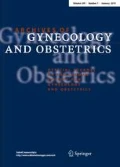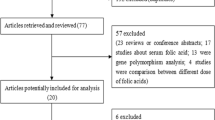Abstract
The effect of periconceptional multivitamin/trace element supplementation on pregnancy outcomes was evaluated in a randomised controlled trial. The final data-base included 5,502 females with confirmed pregnancy. A multivitamin including 0.8 mg folic acid or a trace element were supplemented for at least 28 days before conception and continuing for at least until the second missed menstrual period. Number of pregnancies, terminations of pregnancies, four types of fetal deaths, livebirths including low birth weight, preterm birth and sex ratio were analysed. Periconceptional multivitamin supplementation increased fertility (higher rates of cumulative conceptions and multiple births), had no significant effect on the rate of different groups of fetal deaths, low birth weight and preterm birth in singletons. This primary preventive method can reduce the occurrence and recurrence of neural-tube defects and had no other significant effect on pregnancy outcomes except multiple births.
Similar content being viewed by others
References
Baumslag N, Edelstein T, Metz J (1970) Reduction of incidence of prematurity by folic acid supplementation in pregnancy. Brit Med J 1:16–17
Czeizel AE (1988) Medical genetics in Hungary. J. Med Genet 25:2–8
Czeizel AE (1993) Prevention of congenital abnormalities by periconceptional multivitamin supplementation. Br Med J 306:1645–1648
Czeizel AE, Dudás I (1992) Prevention of the first occurrence of neural-tube defects by periconceptional multivitamin supplementation. N Engl J Med 327:1832–1835
Czeizel AE, Susánszky E (1993) Diet intake and vitamin supplement use of Hungarian women during the preconceptional period. Int J Vit Nutr Res (submitted)
Czeizel AE, Dudás I, Fritz G, Técsöi A, Hanck A, Kunovits G (1992) The effect of multivitamin mineral supplementation on vertigo, nausea and vomiting in the first trimester of pregnancy. Arch Gynecol Obstet 251:181–185
Czeizel AE, Dudás I, Fritz G (1992) The check-up of reproductive health and genetic counseling. Genetic Counseling 3: 61–66
Czeizel AE, Métneki J, Dudás I (1994) Higher rate of multiple births after periconceptional multivitamin supplementation. N Engl J Med (in press)
Giles PF, Harcourt AG, Whiteside MG (1971) The effect of prescribing folic acid during pregnancy on birth-weight and duration of pregnancy: A double-blind trial. Med J Aust 2: 17–21
Goldenberg RL, Tamura T, Cliver SP, Cutter GR, Hoffman HL, Copper RL (1992) Serum folate and fetal growth retardation: a matter of complicance? Obstet Gynec 79: 719–722
Hibbard BM (1964) The role of folic acid in pregnancy. With particular reference to anaemia, abruption and abortion. J Obstet Gynaecol Br Commonwlth 71: 529–542
Iyengar L, Rajalakshmi K (1975) Effect of folic acid supplement on birth weights of infants. Am J Obstet Gynecol 122: 332–336
Koller S (1988) Preventive effects of vitamin and minerals on early abortion. In: Berger H (ed) Vitamins and Minerals in Pregnancy and Lactation. Nestlé Nutrition Workshop Series. Raven Press New York. Vol 16: 27–28
Laurence KM, James N, Miller MH, Tennant GB, Campbell H (1981) Double-blind randomised controlled trial of folate treatment before conception to prevent recurrence of neural-tube defects. Br Med J 282: 1509–1511
Martin RH, Harper TA, Kelso W (1965) Serum folic acid in recurrent abortions. Lancet I: 670–672
Miller PM, Pratten MK, Beck F (1989) Growth of 9.5 day rat embroys in folic acid deficient serum. Teratology 39: 375–385
MRC Vitamin Study Research Group (1991) Prevention of neural tube defects: Results of the MRC Vitamin Study. Lancet 338: 131–137
Rolschau J, Date J, Kristoffersen K (1979) Folic acid supplement and intrauterine growth. Acta Obstet Gynecol Scand 58: 343–346
Smithells RW, Sheppard S, Schorah CJ, Seller MJ, Nevin NC, Harris R, Read AP, Fielding DW (1980) Possible prevention of neural tube defects by periconceptional vitamin supplementation. Lancet I: 339–340
Smithells RW, Sheppard S, Wild J, Schorah CJ (1989) Prevention of neural tube defect recurrences in Yorkshire. Final report. Lancet II: 498–499
Wald N (1993) Folic acid and the prevention of neural tube defects. In: Keen CL, Bendich A, Willhite CC (eds) Maternal Nutrition and Pregnancy Outcome. Ann NY Acad Sci 678: 112–129
Author information
Authors and Affiliations
Rights and permissions
About this article
Cite this article
Czeizel, A.E., Dudás, I. & Métneki, J. Pregnancy outcomes in a randomised controlled trial of periconceptional multivitamin supplementation. Arch Gynecol Obstet 255, 131–139 (1994). https://doi.org/10.1007/BF02390940
Received:
Accepted:
Issue Date:
DOI: https://doi.org/10.1007/BF02390940




